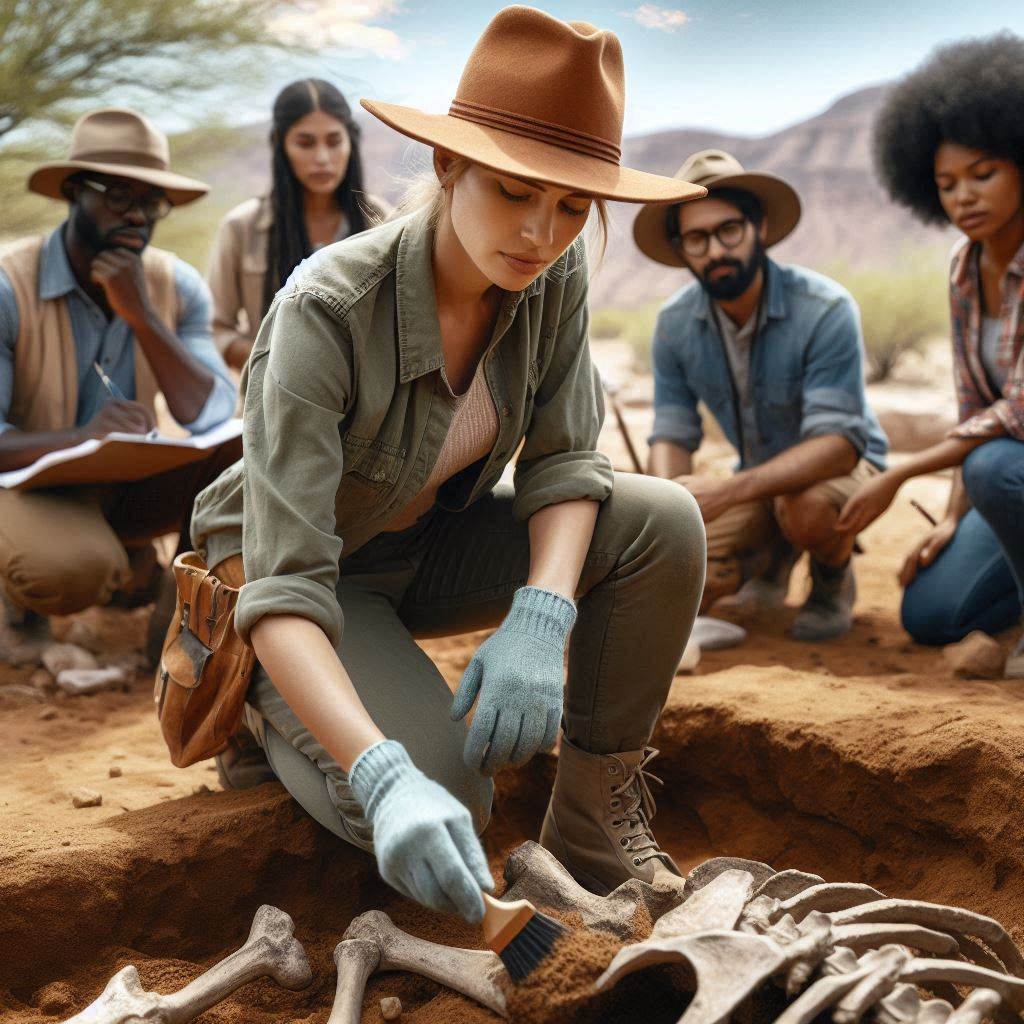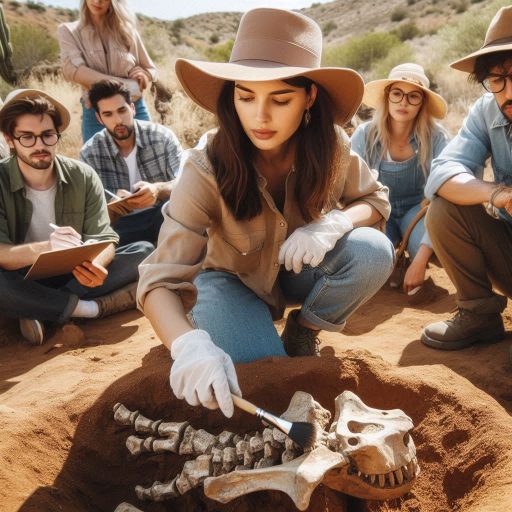Introduction
Archaeological practices involve the study of human history through material remains.
Archaeologists excavate sites to uncover artifacts, structures, and cultural landscapes.
Their work helps us understand past societies and their contributions to our world.
Ethical considerations play a crucial role in archaeology.
They guide researchers in making responsible decisions about their practices.
Upholding ethical standards protects cultural heritage and respects the rights of communities involved.
Numerous ethical issues arise in archaeological practices.
First, the preservation and conservation of archaeological sites are paramount.
Researchers must consider the impact of their work on these sites.
Cultural sensitivity and indigenous rights are also critical concerns.
Respecting the cultural heritage of indigenous communities is essential for ethical research.
The illegal trafficking of artifacts presents another significant challenge.
Looting and the sale of stolen items undermine archaeological integrity.
Moreover, the publication and interpretation of findings require transparency.
Researchers must accurately report their discoveries to maintain trust in the field.
Finally, engaging with local communities is vital for ethical collaboration.
Researchers should involve communities in archaeological projects to foster mutual respect.
This blog post will delve into these ethical issues and their importance in archaeological practices.
Definition of Ethical Issues in Archaeology
What Constitutes Ethical Issues in the Field
Ethical issues in archaeology refer to moral principles that guide archaeological practices.
These principles ensure respect for cultural heritage, human remains, and local communities.
Ethical considerations govern how archaeologists conduct their research and interact with various stakeholders.
Archaeologists face ethical dilemmas regarding site excavation and artifact retrieval.
They must consider the cultural significance of the sites they investigate.
Disturbing burial sites, for instance, raises ethical concerns about respect for the deceased and their descendants.
Impact of Unethical Practices on the Archaeological Community and Knowledge
Unethical practices can have severe repercussions on the archaeological community.
For example, looting and illegal excavation damage historical sites and erode public trust.
Such actions undermine the integrity of archaeological research and its findings.
When artifacts are removed without proper documentation, their context is lost.
This loss of context diminishes the value of the artifacts and limits knowledge about the past.
Unethical behavior can also lead to misinformation, resulting in misguided conclusions about archaeological findings.
Additionally, unethical practices can harm relationships with local communities.
Archaeologists often rely on these communities for access to sites and information.
Disregarding their rights and cultural values can create tensions and hinder future collaborations.
To address these issues, archaeologists must adhere to established ethical guidelines.
Professional organizations, such as the Society for American Archaeology, provide resources to navigate ethical dilemmas.
These guidelines encourage archaeologists to engage with local communities and prioritize their interests.
Furthermore, transparency in research practices enhances credibility.
Archaeologists should document their methods and findings, allowing for peer review and public scrutiny.
Open communication fosters trust and encourages collaboration with various stakeholders.
Ethical training and education play a vital role in promoting responsible archaeological practices.
Institutions should include ethics courses in archaeology programs to prepare future professionals.
By instilling strong ethical principles, the field can cultivate a culture of responsibility.
Ethical issues in archaeology are critical to preserving cultural heritage and fostering trust within communities.
Unethical practices can lead to significant damage to the archaeological record and hinder knowledge advancement.
Therefore, archaeologists must prioritize ethical standards in their work.
By respecting cultural values, engaging with communities, and adhering to guidelines, archaeologists can ensure that their practices contribute positively to the field.
This commitment will help preserve our shared history and promote a deeper understanding of our past.
Preservation and Conservation of Sites
Importance of Preserving and Conserving Archaeological Sites
Preserving and conserving archaeological sites is crucial for understanding our cultural heritage.
These sites provide invaluable insights into past societies and civilizations.
They hold artifacts, structures, and information that tell stories of human history.
When we preserve sites, we protect them from environmental damage and human interference.
Conservation efforts ensure that future generations can study and appreciate these historical treasures.
Moreover, preserving sites promotes tourism, benefiting local economies and communities.
Archaeological sites also serve as educational resources.
Schools and universities can use these sites for hands-on learning experiences.
Engaging with archaeological sites helps foster a sense of identity and cultural pride within communities.
By maintaining and preserving these sites, we can stimulate interest in archaeology.
This interest encourages public support for archaeological research and conservation initiatives.
When people understand the value of preserving history, they are more likely to advocate for site protection.
Ethical Considerations When Excavating and Documenting Sites
Excavating and documenting archaeological sites raises several ethical considerations.
First, archaeologists must respect the cultural significance of the sites.
They should consult with local communities to understand their perspectives and values.
Before excavation, archaeologists should conduct thorough research.
This research helps identify the site’s historical importance and potential impact on the local community.
Creating a clear excavation plan is essential to minimize disruption during the process.
During excavation, archaeologists must adhere to strict protocols.
They should document every finding meticulously to preserve the context of artifacts.
This documentation ensures that future researchers can interpret the site accurately.
It is also crucial to handle artifacts with care.
Proper techniques for excavation and storage help prevent damage to these valuable objects.
Unethical handling can lead to the loss of critical information.
Furthermore, archaeologists must consider the long-term implications of their work.
Once a site is excavated, it may never be the same.
Archaeologists should prioritize preservation over extraction whenever possible.
Collaboration with conservators is vital in the preservation process.
Conservators can provide expertise on how to protect and restore artifacts and sites.
This partnership ensures that archaeological findings are maintained for future study.
Lastly, transparency is essential in archaeological practices.
Sharing findings with the public fosters trust and accountability.
Archaeologists should communicate the significance of their work to engage the community.
Preserving and conserving archaeological sites is vital for understanding our history.
Ethical considerations during excavation and documentation help protect cultural heritage.
By prioritizing preservation and ethical practices, archaeologists can ensure that our shared history remains accessible for future generations.
Read: Women in Botany: Celebrating Pioneers and Leaders
Cultural Sensitivity and Indigenous Rights
Respecting Cultural Heritage and Rights of Indigenous Communities
Respecting the cultural heritage and rights of Indigenous communities is crucial in archaeology.
Indigenous peoples hold deep connections to their ancestral lands and artifacts.
Their perspectives and knowledge can enrich archaeological research significantly.
Thus, archaeologists must prioritize these communities in their work.
Collaboration with Indigenous communities fosters mutual respect and understanding.
Archaeologists should seek permission before conducting research on Indigenous lands.
Consulting with these communities ensures that their cultural beliefs and practices are honored.
This respect helps build trust and fosters meaningful partnerships.
Moreover, Indigenous communities often possess traditional knowledge that can inform archaeological practices.
Engaging with them can enhance research outcomes and contribute to cultural preservation.
By incorporating Indigenous perspectives, archaeologists can create a more holistic understanding of historical contexts.
Ethical archaeology requires recognizing the impact of colonialism on Indigenous peoples.
Many archaeological practices have historically marginalized these communities.
Therefore, archaeologists must actively work to rectify these past injustices.
Issues Related to Ownership and Control of Archaeological Artifacts
Ownership and control of archaeological artifacts present significant challenges in the field.
Many artifacts originate from Indigenous lands and are culturally significant to those communities.
When artifacts are removed without consent, it raises ethical concerns about their rightful ownership.
Indigenous communities often advocate for the repatriation of their cultural artifacts.
They argue that these items are integral to their identity and heritage.
Returning artifacts can help heal historical wounds and restore cultural integrity.
Legal frameworks vary regarding artifact ownership.
Some countries have laws protecting Indigenous rights, while others do not.
This inconsistency creates complications for archaeologists working with Indigenous communities.
In addition, the commercialization of artifacts poses ethical dilemmas.
The sale of Indigenous artifacts can exploit cultural heritage for profit.
Archaeologists should oppose practices that commodify cultural items, prioritizing cultural significance over economic gain.
Collaboration between archaeologists and Indigenous communities can help address these issues.
Open dialogue about ownership and control fosters a more equitable approach.
Establishing clear agreements regarding artifacts can ensure that Indigenous rights are respected.
Furthermore, archaeologists should advocate for policies that support Indigenous rights.
They can participate in discussions about legislation affecting Indigenous communities.
Supporting such initiatives can promote cultural sensitivity and ethical practices in archaeology.
Respecting Indigenous rights and cultural heritage is essential for ethical archaeology.
Collaborating with Indigenous communities enriches research and promotes cultural preservation.
Addressing ownership and control issues can lead to a more equitable future for archaeology.
By prioritizing Indigenous perspectives, the field can contribute positively to society and history.
Read: How Climate Change Is Impacting Plant Research
Illegal Trafficking of Artefacts
Overview of the Problem of Looting and Illegal Trafficking of Archaeological Artifacts
Looting and illegal trafficking of archaeological artifacts pose significant threats to cultural heritage.
Criminal organizations exploit conflicts, poverty, and weak legal systems to loot sites.
This illicit activity results in the destruction of historical contexts and archaeological records.
Many countries face rampant looting due to economic instability.
Archaeological sites become easy targets for those seeking financial gain.
Once stolen, artifacts are often sold on the black market, making them difficult to trace.
The illegal trafficking of artifacts leads to a loss of cultural identity.
These artifacts often carry immense historical and cultural significance for local communities.
When they are removed from their context, their meaning and value diminish.
International cooperation is crucial in combating illegal trafficking.
Various organizations, such as UNESCO, work to raise awareness and implement protective measures.
Countries must collaborate to strengthen laws and enforcement against trafficking networks.
Additionally, educating the public about the importance of protecting cultural heritage can deter looting.
When people understand the value of artifacts, they may resist purchasing stolen goods.
Public awareness campaigns can emphasize the need for ethical practices in collecting and trading artifacts.
Ethical Implications of Buying and Selling Stolen Artifacts
Buying and selling stolen artifacts raise serious ethical concerns.
Acquiring items without knowing their provenance contributes to the demand for illegal goods.
This demand fuels looting and endangers archaeological sites worldwide.
Collectors and dealers who knowingly purchase stolen artifacts perpetuate the cycle of theft.
They prioritize profit over the preservation of cultural heritage.
By participating in this market, they undermine the efforts of archaeologists and conservators.
Moreover, the sale of stolen artifacts often exploits marginalized communities.
Looters may not fully understand the consequences of their actions.
They may only see the immediate financial benefits without recognizing the long-term cultural loss.
Ethical collectors should seek items with verifiable provenance.
They must ensure that their acquisitions do not contribute to illegal trafficking.
Supporting legitimate channels for artifact acquisition promotes responsible collecting and respect for cultural heritage.
Art dealers and auction houses also bear responsibility.
They should implement strict policies for verifying the provenance of artifacts.
Transparency in the buying and selling process can help prevent the circulation of stolen goods.
Finally, governments play a crucial role in combating illegal trafficking.
They must enact and enforce strong laws against the sale of stolen artifacts.
Establishing international agreements can help facilitate the return of looted items to their countries of origin.
The illegal trafficking of artifacts poses a significant threat to cultural heritage.
Understanding the ethical implications of buying and selling stolen artifacts is essential.
By fostering responsible practices, society can work towards preserving our shared history and protecting archaeological sites.
Read: Exploring the Different Branches of Geology

Publication and Interpretation of Findings
Importance of Transparent and Accurate Reporting of Archaeological Findings
Transparent and accurate reporting of archaeological findings is crucial for advancing knowledge.
Archaeologists must share their discoveries openly with the academic community.
This transparency allows others to evaluate, replicate, and build upon their work.
Accurate reporting fosters trust among researchers, stakeholders, and the public.
When findings are presented honestly, it enhances the credibility of the archaeological profession.
Inaccurate or misleading reports can lead to misunderstandings about a site‘s significance and history.
Moreover, thorough documentation of findings contributes to the preservation of cultural heritage.
Well-reported data ensures that important information remains accessible for future generations.
Archaeological research is a collaborative effort, and sharing findings strengthens the community.
Publishing in reputable journals or platforms also ensures that findings reach a broader audience.
Disseminating information widely helps educate the public about archaeology‘s value.
Increased awareness can lead to greater support for preserving archaeological sites.
Furthermore, transparent reporting encourages ethical practices within the field.
It promotes accountability and helps prevent fraudulent claims or interpretations.
Archaeologists must adhere to ethical guidelines when documenting and presenting their findings.
Ethical Considerations When Interpreting and Presenting Archaeological Data
Interpreting and presenting archaeological data involves significant ethical considerations.
Researchers must avoid biases that can distort findings.
Personal beliefs or agendas should not influence the interpretation of data.
Ethical archaeologists approach their work with cultural sensitivity.
They recognize the importance of context in understanding artifacts and sites.
Misrepresenting data can lead to harmful stereotypes or misconceptions about cultures.
Moreover, archaeologists should acknowledge the contributions of others in their work.
Proper citation of sources and collaboration with Indigenous communities promotes ethical scholarship.
This acknowledgment shows respect for the knowledge and efforts of other researchers.
Additionally, archaeologists must be cautious about speculative interpretations.
Presenting unverified hypotheses as facts can mislead readers.
Researchers should clearly differentiate between established findings and interpretations that require further investigation.
Involving interdisciplinary approaches can enhance data interpretation.
Collaborating with experts in related fields can provide valuable insights.
This collaboration enriches the understanding of archaeological findings and broadens perspectives.
Ethical considerations also extend to the implications of published findings.
Researchers must consider how their interpretations may impact local communities.
Sharing sensitive information can lead to exploitation or harm to these communities.
Lastly, archaeologists should remain open to constructive criticism.
Engaging with peers fosters a culture of continuous improvement.
It encourages researchers to refine their interpretations and adopt ethical standards.
Transparent and accurate reporting of archaeological findings is vital for advancing the field.
Ethical considerations in interpreting data promote integrity and respect for cultural heritage.
By adhering to these principles, archaeologists can contribute positively to the understanding of our shared history.
Read: Top Skills Needed for a Successful Geology Career
You Might Also Like: Famous Cases Solved by Forensic Scientists
Engaging with Local Communities
Importance of Involving Local Communities in Archaeological Projects
Involving local communities in archaeological projects is essential for various reasons.
Local communities often possess valuable knowledge about their heritage and history.
They can provide insights that enhance archaeological research and interpretations.
Engaging these communities fosters a sense of ownership over their cultural heritage.
Community involvement can also promote sustainable archaeological practices.
Local residents can assist in preserving sites, preventing looting and vandalism.
Their participation helps ensure that archaeological activities align with community interests and needs.
Moreover, collaboration with local communities can enhance public support for archaeological projects.
When community members feel included, they are more likely to support research efforts.
This support can lead to better funding and resources for archaeological work.
Local communities often serve as stewards of their cultural heritage.
Their firsthand experiences contribute to a more holistic understanding of the archaeological context.
By involving them, archaeologists can gain a deeper appreciation for the significance of their findings.
Additionally, community engagement can create educational opportunities.
Archaeologists can share their knowledge and skills, fostering interest in archaeology among local residents.
This education can inspire future generations to pursue careers in the field.
Ethics of Community Engagement and Collaboration in Archaeological Research
Ethical considerations play a crucial role in community engagement during archaeological research.
Archaeologists must approach collaborations with respect and sensitivity.
They should recognize the rights and perspectives of local communities.
Clear communication is essential for ethical engagement.
Archaeologists must explain their research objectives and methodologies to community members.
This transparency fosters trust and builds positive relationships between researchers and locals.
Consent is another vital aspect of ethical community engagement.
Archaeologists should obtain informed consent from local communities before conducting research.
This ensures that community members understand the implications of their participation.
Moreover, archaeologists must acknowledge the intellectual property rights of local communities.
Researchers should respect the knowledge and traditions of indigenous populations.
Providing proper credit and recognition is essential when sharing findings.
Collaboration should be mutually beneficial.
Both archaeologists and local communities should gain from the partnership.
Researchers can share resources and expertise, while communities can contribute their cultural knowledge.
Furthermore, ethical engagement involves ongoing dialogue.
Archaeologists should maintain communication with local communities throughout the research process.
This dialogue allows for addressing concerns and adapting methodologies as needed.
Lastly, archaeologists must remain accountable for their actions.
They should actively seek feedback from local communities and incorporate it into their work.
This accountability demonstrates respect and reinforces positive relationships.
Engaging local communities in archaeological projects is vital for fostering collaboration and preserving cultural heritage.
Ethical considerations ensure that these engagements are respectful and beneficial for all parties involved.
By prioritizing community involvement, archaeologists can enhance their research and promote sustainable practices.
Funding and Sponsorship
Ethical Considerations When Accepting Funding from Private Sources
Accepting funding from private sources raises important ethical considerations for archaeologists.
Researchers must evaluate the motives behind the funding.
Understanding the funders’ agendas can help prevent potential conflicts of interest.
Archaeologists should consider whether funding will influence research outcomes or interpretations.
Maintaining objectivity in research is paramount.
Researchers must avoid compromising their integrity for financial support.
Transparency is essential when accepting private funding.
Archaeologists should openly disclose funding sources in their research publications.
This practice helps maintain trust with the academic community and the public.
Moreover, archaeologists should assess the reputations of potential funders.
Supporting organizations with questionable ethics can harm the researcher’s credibility.
Investigating funders’ histories can help ensure alignment with ethical research standards.
Researchers must also establish clear agreements with funding sources.
Defining the scope of the partnership can prevent misunderstandings later.
These agreements should outline expectations for research autonomy and publication rights.
Additionally, archaeologists should be wary of restrictive funding conditions.
Some funders may impose limitations that compromise academic freedom.
Researchers should negotiate terms that uphold the integrity of their work.
Transform Your Career Today
Unlock a personalized career strategy that drives real results. Get tailored advice and a roadmap designed just for you.
Start NowImpact of Funding on the Integrity and Objectivity of Archaeological Research
Funding can significantly impact the integrity and objectivity of archaeological research.
Financial support can create pressure to produce favorable results.
This pressure can lead to biased interpretations or selective reporting of findings.
Moreover, researchers may feel compelled to align their work with funders’ interests.
Such alignment can hinder the pursuit of unbiased research objectives.
Archaeologists must prioritize scientific integrity over financial gain.
The perception of funding influence can also affect public trust.
If the public believes that research is compromised by funding, it undermines confidence in the findings.
Trust is crucial for the credibility of the archaeological profession.
Furthermore, funding disparities can create inequities in research opportunities.
Well-funded projects may overshadow smaller, underfunded initiatives.
This disparity can result in an incomplete understanding of archaeological contexts.
Additionally, the competition for funding can drive unethical practices.
Researchers may prioritize securing funding over maintaining ethical standards.
This shift can undermine the core values of archaeology as a discipline.
To mitigate these risks, archaeologists should seek diverse funding sources.
Relying on a single funding source increases vulnerability to bias.
Diversification helps ensure that no single entity exerts undue influence on research.
Collaboration with various stakeholders can also enhance research integrity.
Partnering with academic institutions, government agencies, and nonprofits fosters transparency.
These collaborations can provide a balance of perspectives and resources.
Ethical considerations in accepting funding are crucial for archaeological research.
The impact of funding on research integrity and objectivity cannot be underestimated.
By prioritizing transparency and accountability, archaeologists can uphold the discipline’s ethical standards while securing necessary support.
Conclusion
This blog post discussed several critical ethical issues in archaeological practices.
We explored the importance of ethical considerations in engaging local communities.
Respecting indigenous rights and cultural heritage is essential for responsible research.
Additionally, we examined the challenges of funding and sponsorship.
Accepting funding from private sources can raise ethical concerns about bias.
Researchers must prioritize integrity to maintain public trust in their work.
Preserving and conserving archaeological sites is another key ethical responsibility.
Archaeologists must consider the long-term impact of their excavations on cultural heritage.
Engaging in sustainable practices ensures that future generations can appreciate these sites.
The illegal trafficking of artifacts poses significant ethical challenges.
Archaeologists must advocate against looting and the sale of stolen items.
Upholding ethical standards helps protect cultural heritage from exploitation.
Finally, accurate reporting and interpretation of findings are vital.
Researchers must maintain transparency and accountability in their work.
Upholding ethical standards ensures the integrity of archaeological practices.
In summary, maintaining ethical practices is crucial for preserving cultural heritage.
By prioritizing these standards, archaeologists contribute positively to their field and society.
Ethics in archaeology strengthens our understanding of human history and fosters respect for diverse cultures.
[E-Books for Sale]
The Big Book of 500 High-Paying Jobs in America: Unlock Your Earning Potential
$19.99 • 500 High-Paying Jobs • 330 pages
Explore 500 high-paying jobs in America and learn how to boost your career, earn more, and achieve success!
See All 500 High-Paying Jobs of this E-Book
1001 Professions Without a Degree: High-Paying American Jobs You Can Start Now
$19.99 • 1001 Professions Without a Degree • 174 pages
Discover 1001 high-paying jobs without a degree! Unlock career tips, skills, and success strategies for just $19.99!




